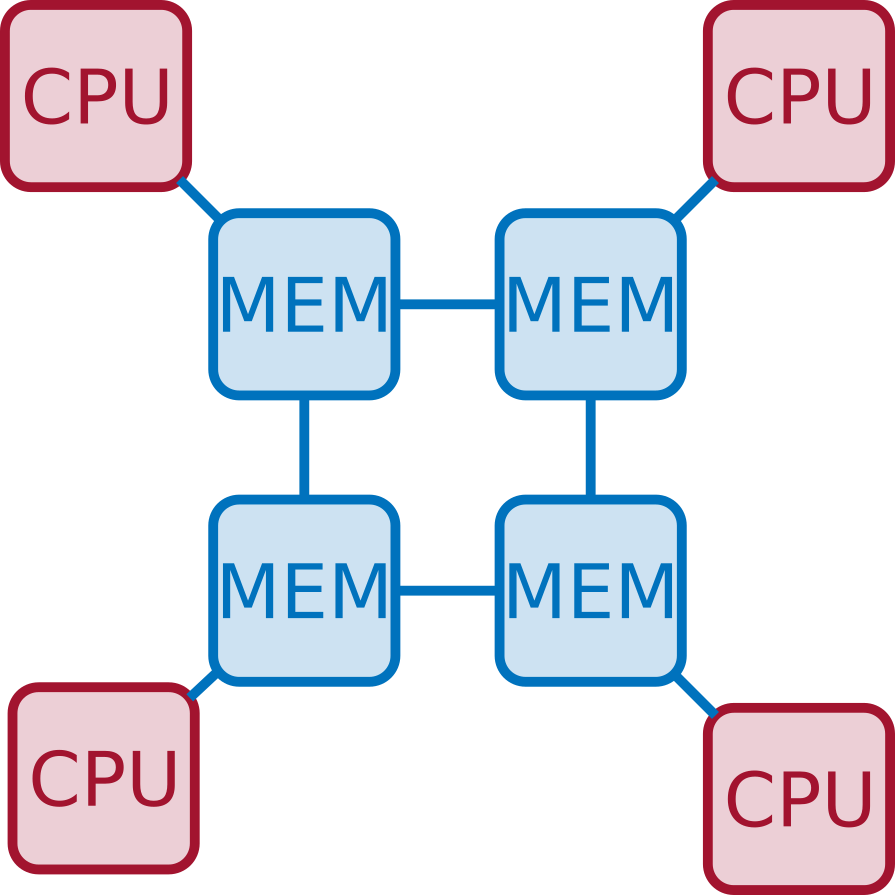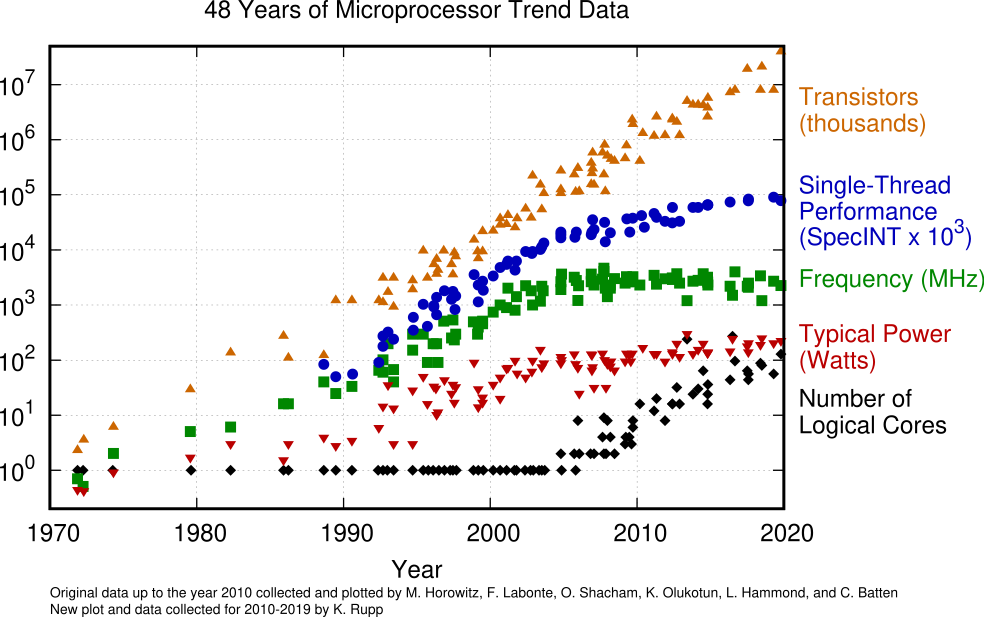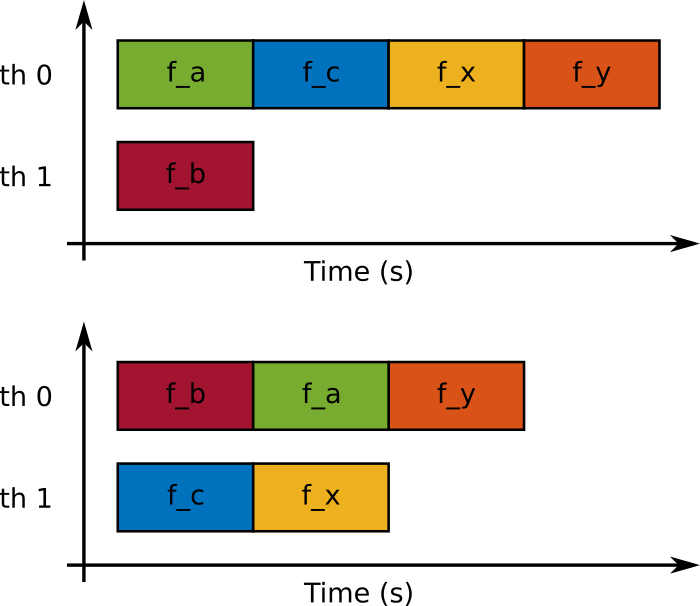
This is org-mode document. Org-mode is a markup language which allows to write text documents containing executable code blocks.
Org-mode can do much more than this and you can find out more here.
Org-mode works in emacs (the best editor in the world).
You can do two things with code blocks (besides simply reading them):
execute: this can be done using the C-c C-c (Ctrl-c
Ctrl-c) keybinding. The stdout of the code will be appended below the
code block itself
tangle: tangling a code block means creating a separate file that
contains the code which can thus be compiled and run as usual. If you
hit C-c C-v C-t (this call the emacs function
org-babel-tangle) all the code blocks in this file will be
tangled. If, instead, you only want to tangle a single code blocks, go
to that block and hit C-u C-c C-v C-t
Once you have tangled a code block, you can compile and run it like any other code. For the code blocks of this document to work, you have to use the following compile command:
gcc -fopenmp -I. aux.c code_block.c -o code_blockAnd then you can run it by launching the code_block
executable
./code_blockSet an environment variable: in order to set an
environment variable within emacs you have to hit
M-x setenv then write the name of the variable, hit enter,
write its value and hit enter again
Refresh images in an org-mode document: if
images don't show up, use the command M-x
org-redisplay-inline-images
Show this document as a presentation: to show
this document as a sequence of slides, you must install the emacs
org-tree-slide package. Then open the document and execute
the command M-x
org-tree-slide-mode. You can mode forward and backward using the
> and < keys. The setup code at the
bottom of this file should automagically install this package upon
opening
Export and org-mode document: Org-mode lets you
export org-mode documents in various formats such as pdf or html. Just
hit C-c C-e and follow the instructions.
When you open this document, the code block at the bottom (in the
Setup section) is supposed to be executed automatically to setup your
environment. If this does not happen (it may be the case in older emacs
version), just go there and hit C-c C-c to execute it
manually. Also, the two code blocks named auxc and
auxh are supposed to be tangled automatically. If this does
not happen, do it manually.

Roughly speaking, parallel computers can be classified into two types:
Shared memory: all the CPUs share one (logical) memory, i.e., all processes can access the same addressing space regardless of the CPU they are running on. This makes it simple to communicate data from one process to another
Distributed memory: the computer is actually formed of multiple node, each having one or more CPUs and its own memory. Nodes are connected through a network. A process running on one node can only access data on the local memory; therefore, if it needs data that is on another node, a message must be exchanged through the network
One "logical memory" does not necessarily mean that only one physical memory exists. If multiple memory modules exist, access to data may non-uniform

Both types of shared-memory architectures can be programmed using the same tools and technologies. When performance is a concern, though, special care must be taken for NUMA machines (we will not cover in this course)
Until the early 00's all processors had only one core (in fact we did not use the word "core" at all). Then why have multicore processors become ubiquitous? Energy consumption is the reason why:
P = CV2f
however there is a linear dependence between f and V, therefore P grows as the cube of $f$!!!
Because the performance of single-core processors could only be improved by increasing the frequency, this trend became unsustainable.
Multicore processors design relies on Thread Level Parallelism to improve performance. This means that more transistors are used to assemble multiple execution units (i.e., cores) on a single chip. This improves performance with only a linear increase in the energy consumption: the capacitance C grows because of the increased number of transistors.
In fact, it is also possible to produce faster processors which consume less energy!!! Consider a quad-core processor with frequency 0.6f: it will be 2.4 times faster and consume roughly 15\% less energy

Multicore computer: what does it look like?
The hwloc library is designed to retrieve all the
details of the architecture. For example, on my computer, I can run the
lstopo program from hwloc to retrieve the
architecture:
ssh plafrim lstopo --of png Many options exist, but they are not all simple, portable, efficient etc.
Examples:
pThreads (POSIX Threads): difficult to use and debug, not fully portable
Intel TBB/OneAPI: proprietary
Cilk: limited support and portability
OpenMP: extremely portable, efficient, relatively easy to use. huge community and support

OpenMP (Open specifications for MultiProcessing) is an Application Program Interface (API) to explicitly direct multi-threaded, shared memory parallelism.
First standard 1.0 was published in 1997
Latest standard is 5.2 published in November 2021
Many resources at https://www.openmp.org
The OpenMP standard is developed by an advisory board that includes many members from academia (UTK, LBNL, ANL, NASA,…) and industry (Intel, AMD, NEC, Fujitsu, NVIDIA,…)


This course does not cover the whole OpenMP standard. The OpenMP manual is over 600 pages as of today (v5.2)
Only a subset of constructs and clauses will be presented.
Tons of tutorials can be found online but better be used with moderation.
OpenMP is based on a fork-join execution model:

Execution is started by a single thread called master thread
when a parallel region is encountered, the master thread spawns a set of threads
the set of instructions enclosed in a parallel region is executed
at the end of the parallel region all the threads synchronize and terminate leaving only the master
#pragma omp parallel [clause]
if (scalar or logical expression)
private(list)
firstprivate(list)
shared(list)
default(private | shared | none)
reduction(operator:list)
num_threads(scalar integer expression)
{
/* Structured code block */
}
The master is a member of the team and has thread number 0
Starting from the beginning of the region, the code is duplicated and all threads will execute that code.
There is an implied barrier at the end of a parallel section.
If any thread terminates within a parallel region, all threads in the team will terminate.
Just a simple hello world with multiple threads:
start with serial execution
open a parallel region where:
#pragma omp parallel
{
printf("Hello world!\n");
}Just a simple hello world with multiple threads:
start with serial execution
open a parallel region where:
omp_get_thread_num() and
omp_get_num_threads()#pragma omp parallel
{
printf("Hello world from thread %2d in a pool of %2d.\n", omp_get_thread_num(),
omp_get_num_threads());
}How many threads do we have in the parallel regions of a code? The number of threads depends on:
Evaluation of the if clause (one or many)
Setting of the num_threads clause
Use of the omp_set_num_threads() library
function
Setting of the OMP_NUM_THREADS environment
variable
Implementation default - usually the number of CPUs on a node, though it could be dynamic
Complete example
int iam, nth, n=5;
#pragma omp parallel
{
printf("Region 1 thread %2d / %2d.\n", omp_get_thread_num(), omp_get_num_threads());
}
omp_set_num_threads(n);
#pragma omp parallel
{
printf("Region 2 thread %2d / %2d.\n", omp_get_thread_num(), omp_get_num_threads());
}
#pragma omp parallel num_threads(2)
{
printf("Region 3 thread %2d / %2d.\n", omp_get_thread_num(), omp_get_num_threads());
}
#pragma omp parallel if(n<5)
{
printf("Region 4 thread %2d / %2d.\n", omp_get_thread_num(), omp_get_num_threads());
}
Here is a minor variant of the hello world program…with a bug
int iam, nth;
#pragma omp parallel
{
iam = omp_get_thread_num();
nth = omp_get_num_threads();
do_stuff(1);
printf("Hello world from thread %d in a pool of %2d.\n", iam, nth);
}Most variables are shared by default
Global variables include:
Private variables include:
Fortran: Automatic variables within a statement block
The OpenMP Data Scope Attribute Clauses are used to explicitly define how variables should be scoped. They include:
privatefirstprivateshareddefaultreductionprivate(list): a new object of the same type is
created for each thread (uninitialized!)
firstprivate(list): Listed variables are initialized
according to the value of their original objects prior to entry into the
parallel or work-sharing construct.
lastprivate(list): The value copied back into the
original variable object is obtained from the last (sequentially)
iteration or section of the enclosing construct.
shared(list): only one object exists in memory and
all the threads access it
default(shared|private|none): sets the default
scoping
reduction(operator:list): performs a reduction on
the variables that appear in its list.
Let's fix the bug: by declaring iam private, each thread
will have its own copy of this variable
int iam, nth;
#pragma omp parallel private(iam)
{
iam = omp_get_thread_num();
nth = omp_get_num_threads();
do_stuff(1);
printf("Hello world from thread %d in a pool of %2d.\n", iam, nth);
}The interest of parallel programming is not to execute the same workload multiple times but to distribute the workload to the available processes so that execution time can be reduced. This implies that multiple instructions will be executed concurrently (or, equivalently, in parallel).
Two successive statements S1 and S2 can be executed concurrently if they are independent. According to the Bernstein conditions there exist three types of dependencies:
Read-After-Write or true
dependency or flow dependency: if
Input(S2) overlaps with Output(S1)
Write-After-Read or
anti-dependency: if Output(S2) overlaps
with Input(S1)
Write-After-Write or output
dependency: if Output(S2) overlaps with
Output(S1)
Example. Are these two statements independent?
a = b+c;
e = d+a;What kind of dependency is there? RAW. Here is a more convoluted example
for(i=1; i<n; i++)
x[i] += x[i-1];Example. Are these two statements independent?
a = b+c;
b = c*2;What kind of dependency is there? WAR. Note that WAR dependencies can be sometimes removed!
d = b;
a = d+c;
b = c*2;Now the second and third statement have become independent. Here is a more convoluted example
for(i=0; i<n-1; i++)
x[i] += x[i+1];Example. Are these two statements independent?
c = a+b;
c = 2;What kind of dependency is there? WAW. Here is a more convoluted example
for(i=0; i<n; i++)
c += x[i];The master directive identifies a code block which is
only executed by the master thread
int iam;
#pragma omp parallel private(iam)
{
iam = omp_get_thread_num();
#pragma omp master
{
do_stuff(0.1);
printf(" ---> This is only done by: %2d\n",iam);
}
printf(" This is also done by: %2d.\n",iam);
}The single directive identifies a code block which is
only executed by one (any) thread
int iam;
#pragma omp parallel private(iam)
{
iam = omp_get_thread_num();
#pragma omp single
{
do_stuff(0.1);
printf(" ---> This is only done by: %2d\n",iam);
}
printf(" This is also done by: %2d.\n",iam);
}One obvious difference between single and
master is that with master only the thread
with id 0 can execute the code block. This has a risk: you have to make
sure that the master thread passes by that code block otherwise it will
never be executed.
Can you spot any other difference from executing the two code blocks
above? There is an implied barrier at the end of the
single block. It can be removed using the
nowait clause
int iam;
#pragma omp parallel private(iam)
{
iam = omp_get_thread_num();
#pragma omp single nowait
{
do_stuff(0.1);
printf(" ---> This is only done by: %2d\n",iam);
}
printf(" This is also done by: %2d.\n",iam);
}In the code below, all the iterations in the loop are independent. This means that they can be executed concurrently. However the code below is wrong because it does not produce the same result as in sequential
int i, n=4;
int a[n], b[n], c[n];
#pragma omp parallel private(i)
{
for (i=0; i<n; i++) {
printf("Thread %2d does iteration %2d\n",omp_get_thread_num(),i);
a[i] += b[i]+c[i];
}
}OpenMP provides a construct that automatically parallelizes loops by
executing chunks of iterations concurrently. Note that the loop index
i is implicitly private.
int i, n=4;
int a[n], b[n], c[n];
#pragma omp parallel
{
#pragma omp for
for (i=0; i<n; i++) {
printf("Thread %2d does iteration %2d\n",omp_get_thread_num(),i);
a[i] += b[i]+c[i];
}
}The schedule clause in the for construct
specifies how the iterations of the loop are assigned to threads:
static: loop iterations are divided into pieces of
size chunk and then statically assigned to threads in a round-robin
fashion
dynamic: loop iterations are divided into pieces of
size chunk, and dynamically scheduled among the threads; when a thread
finishes one chunk, it is dynamically assigned another
guided: for a chunk size of 1, the size of each
chunk is proportional to the number of unassigned iterations divided by
the number of threads, decreasing to 1. For a chunk size with value k
(greater than 1), the size of each chunk is determined in the same way
with the restriction that the chunks do not contain fewer than k
iterations
runtime: The scheduling decision is deferred until
runtime by the environment variable OMP SCHEDULE
Let's see how schedule works:
int i;
#pragma omp parallel for num_threads(4) schedule(guided,25)
for (i=0; i<400; i++)
printf("%3d %2d\n",i,omp_get_thread_num());reset
set term png size 700, 400
set xlabel "iterations"
set ylabel "thread"
set yrange [-0.5:3.5]
set ytics 0,1,3
set grid ytics lt 1 lc 'gray80'
plot "res.data" with points pt 6 title 'Iteration'
set output
The collapse clause allows for combining multiple loops
into a single one and for parallelizing its iterations. The number of
loops to collapse can be provided as an option
int i, j;
#pragma omp parallel for private(i,j) collapse(2)
for (i=0; i<2; i++) {
for (j=0; j<4; j++) {
printf("Thread %2d does iteration i:%2d j:%2d\n",omp_get_thread_num(),i,j);
}
}A barrier is simply a waiting point: all threads must wait for all the others to reach a barrier point before moving on. Example
int iam;
double t=secs();
#pragma omp parallel private(iam)
{
iam = omp_get_thread_num();
if(iam==0){
do_stuff(0.5); // 0.5 seconds
} else {
do_stuff(0.3); // 0.3 seconds
}
#pragma omp barrier
printf("Thread %2d reached this point at time %f.\n",iam,secs()-t);
}Improper use of barriers can cause deadlocks: if not all threads pass by the barrier, those who do will be waiting forever…
int iam;
double t=secs();
#pragma omp parallel private(iam)
{
iam = omp_get_thread_num();
if(iam==0){
do_stuff(0.5);
} else {
do_stuff(0.3);
#pragma omp barrier
}
printf("Thread %2d reached this point at time %f.\n",iam,secs()-t);
}The critical directive identifies a code block which is
executed in mutual exclusion by all threads, i.e., one
at a time.
int iam;
double t=secs();
#pragma omp parallel private(iam)
{
iam = omp_get_thread_num();
#pragma omp critical
{
do_stuff(0.1);
printf("This is done by %2d at time %f\n",iam, secs()-t);
}
}Critical sections can have names. The name argument is used to identify the critical construct. For any critical construct for which name is not specified, the effect is as if an identical (unspecified) name was specified. It is not possible to have two or more threads in different critical regions that have the same name!
int iam;
double t=secs();
#pragma omp parallel private(iam)
{
iam = omp_get_thread_num();
#pragma omp critical (toto)
{
do_stuff(0.1);
printf("First is done by %2d at time %f\n",iam, secs()-t);
}
#pragma omp critical (titi)
{
do_stuff(0.1);
printf("Second is done by %2d at time %f\n",iam, secs()-t);
}
}The atomic construct ensures that a specific storage location is
accessed atomically so that possible simultaneous reads and writes by
multiple threads do not result in indeterminate values. Five types of
atomic constructs exist: read, write,
update, capture and compare
read: atomically read a memory location, i.e.,
x can not change while being read int x, v;
#pragma omp parallel
{
#pragma atomic read
v = x;
}write: atomically write a memory location
update: atomically update (i.e. read-modify-write) a
memory location
So what's the interest of atomic? take this example: we could
certainly use critical to protect the update of
x[] but this would prevent calls to
compute_one to be executed concurrently. With
atomic only the update of x[] is
serialized.
double t_start=secs(), t_end;
int i, n=100, m=5, tot=0, x[5]={0,0,0,0,0};
#pragma omp parallel for
for(i=0; i<n; i++){
#pragma omp atomic update
x[rnd_int()%m] += compute_one(0.01);
}
t_end = secs()-t_start;
for(i=0; i<m; i++)
tot += x[i];
printf("\nTot:%10d time:%f\n",tot, t_end);capture: atomically update a memory location and
capture its initial or final value int x, v, y, w;
#pragma omp parallel
{
/* Capture initial value */
#pragma atomic capture
v = x++;
/* Capture final value */
#pragma atomic capture
w = ++y;
}compare: atomically and conditionally update a memory
locationint i, n=1000, min=99999999;
int x[n];
rand_fill(x, n);
#pragma omp parallel for
for(i=0; i<n; i++){
#pragma omp atomic compare
if (x[i] < min) { min = x[i]; }
}
printf("Min is %d\n",min);
Assume this simple code that computes the sum of all the elements of an array
int i, sum, n=1000;
int x[n];
rand_fill(x, n); sum=0;
for(i=0; i<n; i++){
sum += x[i];
}
printf("Sum is %d\n",sum);
The iterations of this loop are clearly dependent because of the
updates on sum. We could actually use a critical section or
an atomic update but we would loose all performance.
Reductions allow us to take advantage of associativity and commutativity of some operators (+ in this case):
int i, sum, n=1000;
int x[n];
rand_fill(x, n); sum=0;
#pragma omp parallel reduction(+:sum)
{
#pragma omp for
for(i=0; i<n; i++){
sum += x[i];
}
printf("Partial Sum on %d is %d\n",omp_get_thread_num(),sum);
}
printf("Sum is %d\n",sum);
The reduction clause specifies an operator and one or more list items. For each list item, a private copy is created in each implicit task, and is initialized appropriately for the operator. After the end of the region, the original list item is updated with the values of the private copies using the specified operator.
For the C language, predefined reduction operators are
(note that : in the table below is actually a | )
| Operator | Initializer | Combiner |
|---|---|---|
| + | omppriv=0 | ompout += ompin |
| * | omppriv=1 | ompout *= ompin |
| ~ | omppriv=~0 | ompout ~= ompin |
| : | omppriv=0 | ompout := ompin |
| ^ | omppriv=0 | ompout ^= ompin |
| && | omppriv=1 | ompout = ompin && ompout |
| :: | omppriv=0 | ompout = ompin :: ompout |
| max | omppriv=minval | ompout = max(ompin,ompout) |
| min | omppriv=maxval | ompout = min(ompin,ompout) |
The OpenMP task construct simply identifies a block of
code which is ready to be executed and whose execution is
deferred. Once the task is created, it can be executed
by any thread, at any time. This means that we can not
make any assumptions on when a task is executed and by which thread and
in which order all the created tasks are executed.
#pragma omp parallel
{
#pragma omp single
{
#pragma omp task
printf("Thead %2d does task 1\n",omp_get_thread_num());
#pragma omp task
printf("Thead %2d does task 2\n",omp_get_thread_num());
#pragma omp task
printf("Thead %2d does task 3\n",omp_get_thread_num());
#pragma omp task
printf("Thead %2d does task 4\n",omp_get_thread_num());
}
}Why do we need the master construct in the code
above?
A slightly more complex example, with a bug:
int i;
printf("Hello %p\n",&i);
#pragma omp parallel private(i)
{
#pragma omp master
{
for(i=0; i<6; i++)
{
#pragma omp task
printf("Thread %d iteration: %d\n", omp_get_thread_num(), i);
}
}
}What went wrong?
The value of shared variables accessed within a task might change between the creation of the task and its actual execution. Some clauses can be used to define the scope of variables within tasks:
shared(x) means that when the task is executed x is
the same variable (the same memory location) as when the task was
created
firstprivate(x) means that x is private to the task,
i.e., when the task is created, a brand new variable x is created as
well and its value is set to be the same as the value of x in the
enclosing context at the moment when the task is created. This new copy
is destroyed when the task is finished
private(x) means that x is private to the task,
i.e., when the task is created, a brand new variable x is created as
well. This new copy is destroyed when the task is finished
If a variable is private in the parallel region it is
implicitly firstprivate in the included tasks
A slightly more complex example, with a bugfix:
int i;
printf("Hello %p\n",&i);
#pragma omp parallel
{
#pragma omp master
{
for(i=0; i<6; i++)
{
#pragma omp task firstprivate(i)
printf("Thread %d iteration: %d\n", omp_get_thread_num(), i);
}
}
}Creating and handling tasks has a cost. Therefore, it is not always
worth creating a task, for example, if the task has only little work to
do. The if clause can be used to choose whether to create a
task or immediately run the code block
double w=0.5;
#pragma omp parallel
{
#pragma omp master
{
#pragma omp task
printf("Thread %d executes this first task\n", omp_get_thread_num());
#pragma omp task if(w>0.4)
{
do_stuff(w);
printf("Thread %d executes this second task\n", omp_get_thread_num());
}
}
}So how can we be sure that some tasks are actually executed? The
taskwait directive ensures that all the previously
submitted tasks have been executed. Note that this does not include
descendants, i.e., tasks that have been generated by other tasks.
int x, y, z;
#pragma omp parallel
{
#pragma omp master
{
#pragma omp task
x = compute_one(0.2);
#pragma omp task
y = compute_one(0.2);
#pragma omp taskwait
z = x+y;
printf("z is %d\n", z);
}
}It is possible to define an execution order by specifying task
dependencies. This is done through the
depend clause and the Bernstein conditions:
The in dependence-type. The generated task will be a
dependent task of all previously generated sibling tasks that reference
at least one of the list items in an out or
inout dependence-type list.
The out and inout dependence-types. The
generated task will be a dependent task of all previously generated
sibling tasks that reference at least one of the list items in an
in, out, or inout dependence-type
list.
Example:
int a, b, c, x, y;
double t=secs();
#pragma omp parallel
{
#pragma omp master
{
#pragma omp task depend(out:a)
a = f_a();
#pragma omp task depend(out:b)
b = f_b();
#pragma omp task depend(out:c)
c = f_c();
#pragma omp task depend(in:b,c) depend(out:x)
x = f_x(b, c);
#pragma omp task depend(in:a,x) depend(out:y)
y = f_y(a, x);
#pragma omp taskwait
printf("y: %d (correct value is 9) and time is %f\n",y,secs()-t);
}
}Can you draw the dependency graph?
Assuming only two threads are available and all functions take one second, the following two schedulings are possible.

The priority clause can be used to give the OpenMP
scheduler a hint on the importance of a task
int a, b, c, x, y;
double t=secs();
#pragma omp parallel
{
#pragma omp master
{
#pragma omp task depend(out:b) priority(2)
b = f_b();
#pragma omp task depend(out:c) priority(2)
c = f_c();
#pragma omp task depend(out:a)
a = f_a();
#pragma omp task depend(in:b,c) depend(out:x)
x = f_x(b, c);
#pragma omp task depend(in:a,x) depend(out:y)
y = f_y(a, x);
#pragma omp taskwait
printf("y: %d (correct value is 9) and time is %f\n",y,secs()-t);
}
}When using pointers to specify dependencies, you should dereference it to make sure the dependence is inferred from the pointed data rather than the pointer variable.
int x[2]={0,0};
int *p=x;
double t=secs();
#pragma omp parallel
{
#pragma omp master
{
#pragma omp task firstprivate(p) depend(out:*p)
*p = compute_one(1.0);
p+=1;
#pragma omp task firstprivate(p) depend(out:*p)
*p = compute_one(1.0);
#pragma omp taskwait
printf("x: {%d,%d} (correct value is {1,1}) and time is %f\n",x[0],x[1],secs()-t);
}
}A lock is a data of type omp_lock_t which can be used to
prevent simultaneous access to shared resources according to the
schema
acquire (or set or lock) the lock
access data
release (on unset or unlock) the lock
Acquisition of the lock is exclusive in the sense that only one threads can hold the lock at a given time. A lock can be in one of the following states:
uninitialized: the lock is not active and cannot be acquired/released by any thread;
unlocked: the lock has been initialized and can be acquired by any thread;
locked: the lock has been acquired by one thread and cannot be acquired by any other thread until the owner releases it.
Transitions through states can be achieved with the following routines
omp_init_lock: initializes a lock
omp_destroy_lock: uninitializes a lock
omp_set_lock: waits until a lock is available, and
then sets it
omp_unset_lock: unsets a lock
omp_test_lock: tests a lock, and sets it if it is
available
Example
omp_lock_t lock;
omp_init_lock(&lock);
#pragma omp parallel
{
omp_set_lock(&lock);
printf("%d: It's my turn to use the resource\n",omp_get_thread_num());
use_resource();
omp_unset_lock(&lock);
}
omp_destroy_lock(&lock);Example with test lock
omp_lock_t lock;
omp_init_lock(&lock);
#pragma omp parallel
{
while(!omp_test_lock(&lock)){
/* if lock is already locked, I do some other useful stuff */
printf("%d: lock is busy, I do some stuff\n",omp_get_thread_num());
do_stuff(0.5);
}
printf("%d: It's my turn to use the resource\n",omp_get_thread_num());
use_resource();
omp_unset_lock(&lock);
}
omp_destroy_lock(&lock);Do not create a new loop just for the purpose of parallelizing it
#pragma omp parallel
{
nth = omp_get_num_threads();
#pragma omp for
for(i=0; i<nth; i++){
do_stuff();
}
}This is exactly the same as
#pragma omp parallel
{
do_stuff();
}
Tasks have a relatively high overhead and should be used with caution.
Critical sections serialize the work of processes.
#pragma omp parallel for
for(i=0; i<n; i++){
#pragma omp critical
do_stuff();
}The code above is completely sequential. The execution time will be the same as without the parallelization but the iterations will be done in a different order.
Stupid to say but there is no parallelism if you don't put a parallel section somewhere. Just don't forget.
Conversely, if you can merge multiple parallel sections into a single one, it might be good to do so in order to reduce overhead
int seed=-1;
#pragma omp threadprivate(seed)
int rnd_int() {
// & 0x7fffffff is equivalent to modulo with RNG_MOD = 2^31
#if defined(_OPENMP)
if(seed==-1) seed = omp_get_thread_num()+1;
#else
if(seed==-1) seed = 1;
#endif
return (seed = (seed * 1103515245 + 12345) & 0x7fffffff);
}
void rand_fill(int *x, int n){
int i;
for(i=0; i<n; i++){
x[i]=rnd_int()%n-n/2;
}
}
long usecs (){
struct timeval t;
gettimeofday(&t,NULL);
return t.tv_sec*1000000+t.tv_usec;
}
double secs (){
struct timeval t;
gettimeofday(&t,NULL);
return ((double)(t.tv_sec*1000000+t.tv_usec))/1000000.0;
}
void do_stuff(double sec){
long s, e;
s=0; e=0;
s = usecs();
while(((double) e-s)/1000000 < sec)
{
e = usecs();
}
return;
}
int compute_one(double sec){
do_stuff(sec);
return 1;
}
int f_a(){
do_stuff(1.0);
return 1;
}
int f_b(){
do_stuff(1.0);
return 2;
}
int f_c(){
do_stuff(1.0);
return 3;
}
int f_x(int b, int c){
do_stuff(1.0);
return b+c+1;
}
int f_y(int a, int x){
do_stuff(1.0);
return a+x+2;
}
void use_resource(){
do_stuff(1.0);
return;
}
int rnd_int();
void rand_fill(int *x, int n);
long usecs ();
double secs ();
void do_stuff(double sec);
int compute_one(double sec);
int f_a();
int f_b();
int f_c();
int f_x(int b, int c);
int f_y(int a, int x);
void use_resource();